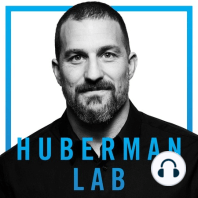88 min listen
The Science of Gratitude & How to Build a Gratitude Practice
FromHuberman Lab
ratings:
Length:
83 minutes
Released:
Nov 22, 2021
Format:
Podcast episode
Description
This episode I discuss the science of gratitude, which has been shown in peer-reviewed studies to have tremendous positive effects on mental and physical health. I explain, however, that most commonly used gratitude practices are ineffective (such as gratitude lists). The key elements of highly effective gratitude practices are described including the essential need for story (narrative), receiving or perceiving gratitude, rather than giving it, and the role that theory of mind plays in this context. I also discuss why we can't simply make up feelings of gratitude and how reluctance undermines the process. I also explain the neural circuit mechanisms that underlie the reductions in fear and increases in motivation and lowering of inflammatory chemicals that effective narrative-based gratitude can trigger. Throughout the episode I use the science of gratitude to design a brief but highly effective protocol. Thank you to our sponsors: ROKA - https://www.roka.com - code "huberman" InsideTracker - https://www.insidetracker.com/huberman Magic Spoon - https://www.magicspoon.com/huberman Our Patreon page: https://www.patreon.com/andrewhuberman Supplements from Thorne: http://www.thorne.com/u/huberman Social: Instagram - https://www.instagram.com/hubermanlab Twitter - https://twitter.com/hubermanlab Facebook - https://www.facebook.com/hubermanlab Website - https://hubermanlab.com Newsletter - https://hubermanlab.com/neural-network Links: Neural Correlates of Gratitude (Damasio) - doi: 10.3389/fpsyg.2015.01491 Reducing Inflammatory Cytokines & Fear With Gratitude - https://doi.org/10.1016/j.bbi.2021.04.019 Timestamps: 00:00:00 Introduction: Gratitude Science & Surprises 00:01:50 Controlling Heart Rate with Story 00:04:33 Sponsors: ROKA, InsideTracker, Magic Spoon 00:09:11 Major, Long-Lasting Benefits of Gratitude Practice 00:12:20 Prosocial vs. Defensive Thinking, Behaviors, & Neural Circuits 00:17:50 Why We All Need an Effective Gratitude Practice 00:21:22 Neurochemistry & Neural Circuits of Gratitude 00:25:10 Prefrontal Cortex Set Context 00:30:10 Ineffective Gratitude Practices; Autonomic Variables 00:34:55 Key Features of Effective Gratitude Practices: Receiving Thanks & Story 00:42:30 Theory of Mind Is Key 00:45:50 Building Effective Gratitude Practices: Adopting Narratives, Duration 00:52:28 Narratives That Shift Brain-Body Circuits 00:56:15 You Can’t Lie About Liking Something; Reluctance In Giving 00:59:55 How Gratitude Changes Your Brain: Reduces Anxiety, Increases Motivation 01:03:00 5 Minutes (Is More Than Enough), 3X Weekly, Timing Each Day 01:05:44 Empathy & Anterior Cingulate Cortex 01:07:35 Reducing Inflammation & Fear with Gratitude 01:10:56 Serotonin, Kanna/Zembrin 01:16:00 Neuroplasticity, Pharmacology, Brain Machine Interfaces 01:18:50 The Best Gratitude Practices: & How To, My Protocol 01:24:25 Subscribe & Feedback, Supporting Sponsors, Supplements (Thorne) Please note that The Huberman Lab Podcast is distinct from Dr. Huberman's teaching and research roles at Stanford University School of Medicine. The information provided in this show is not medical advice, nor should it be taken or applied as a replacement for medical advice. The Huberman Lab Podcast, its employees, guests and affiliates assume no liability for the application of the information discussed. Title Card Photo Credit: Mike Blabac - https://www.blabacphoto.com
Released:
Nov 22, 2021
Format:
Podcast episode
Titles in the series (100)
How to Focus to Change Your Brain | Episode 6: This episode introduces neuroplasticity- which is how our brain and nervous system learns and acquires new capabilities. I describe the differences between childhood and adult neuroplasticity, the chemicals involved and how anyone can increase their... by Huberman Lab
